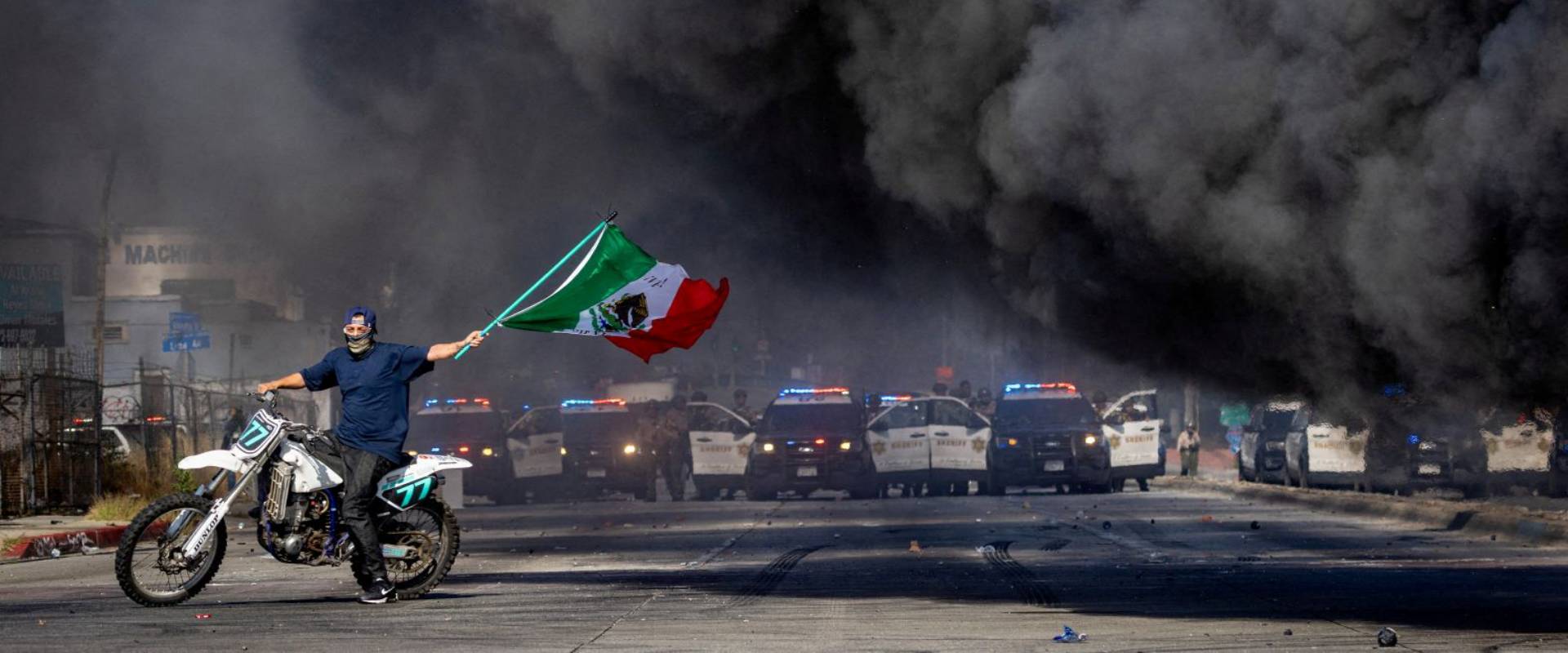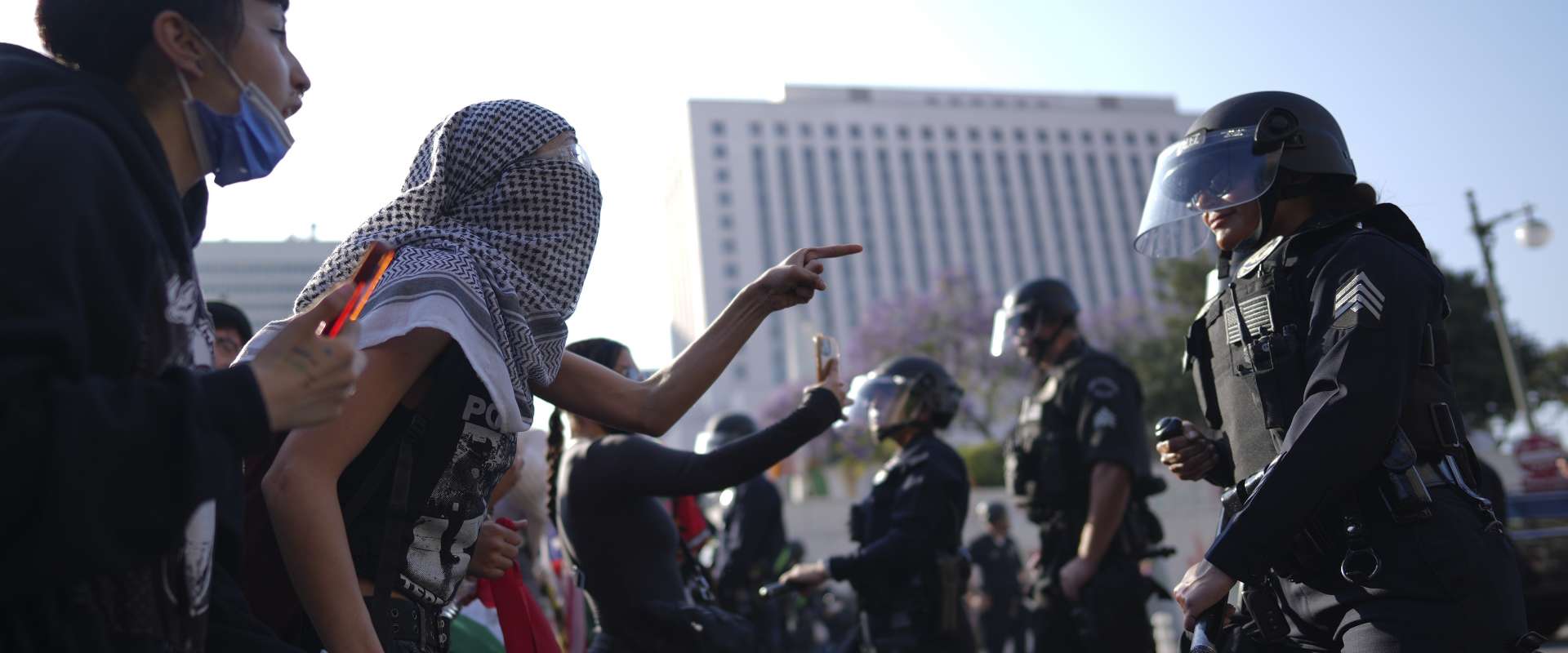“We don’t have a mass revolutionary party. If we did, I would join. Once upon a time, a revolutionary vanguard existed. After the defeat of the New Left, the vanguard has to be rebuilt. We need to knit together activists. Without soviets there would have been no Bolshevik victory. The party has to be rebuilt from below. The temptation of arrogance is strong. It is not just a question of replacing leaders. As C.L.R. James said, ‘Revolution comes like a thief in the night.’”
—David McNally, Spectre editor, speaker at Global Crisis and Global Revolts, Socialism Conference 2023
“ The answer is not to say ‘join my organization.’”
—Ashley Smith, Spectre editor from the floor, Socialism 2023
Spectre has contributed a tremendous amount to a Marxist analysis of the world. At the recent Socialism 2023 conference in Chicago, in the meeting on Global Crisis and Global Revolts, the speakers Shireen Akram-Boshar and David McNally continued this tradition. They gave excellent and optimistic overviews of revolts around the world. They made the important case for struggles against racism, sexism, anti-LGBTQ+ bigotry and more as an integral part of class struggle. They stressed seeing all the crises in the world today as rooted in capitalism. In saying this, they rejected the notion of the “polycrisis” which sees all the crises as disconnected.
The Spectre editors hail from the Leninist tradition. They favor the principle of the vanguard of the working class, which leads class struggle by forming a mass revolutionary party similar to the Bolsheviks in Russia. However, they do not see building small revolutionary organizations as a significant contribution to this process.
Rejecting “micro-sects” versus the Bolshevik experience
David McNally has for years opposed a focus on what he and Hal Draper called “microsects.” This 2019 article for the now-defunct Socialist Worker (US) is a summary of his views — and see Firebrand’s rebuttal to this argument here.
In opposing the strategy of building revolutionary groups as a contribution to building a revolutionary party, McNally mischaracterizes the Bolshevik experience. The Bolsheviks did not start as a mass revolutionary party. They started as the tiny Emancipation of Labor group in the late 1800s. They were a group focused on propaganda and agitation. In What Is to Be Done?, Lenin explicitly opposed an exclusive orientation on economic struggle. He opposed the proponents of economism who supported that orientation. He favored trying to change working-class consciousness by political intervention on a wide range of issues. For Lenin, this political intervention was based on and directly connected to the building of a Marxist organization. Having comrades on the ground making these arguments in an organized way was fundamental.
The Bolsheviks tried to build their party, the Russian Social Democratic Labor Party, before there was the basis for a mass revolutionary party during the 1905 revolution. Lenin did not say “If there was a revolutionary party, I would join it,” as McNally does. He did not argue for building the vanguard first and only later building the party. Instead from the beginning he tried to build revolutionary organization as the basis for a mass revolutionary party. Lenin argued hard against spontaneism — the idea that the working class would automatically develop revolutionary consciousness without intervention of organized revolutionaries.
Spectre’s approach is haunted by problems
There are several other problems with the Spectre approach to organization. First of all, it is based on a stage theory. It says that the existence of a revolutionary vanguard must be the precursor to any successful Marxist organization. It says we must wait until this vanguard exists before forming political organization. It ignores the actual dialectical historical process.
In fact, in the Bolshevik case, there was an interaction between revolutionary organization and the developing working-class vanguard. If the Bolsheviks had waited until the vanguard layer of the working class was fully formed before organizing, they would not have been large enough to be effective during the 1905 or 1917 revolutions.
When class struggle dipped and there was no appreciable vanguard of struggle from 1906–1912, the Bolsheviks maintained their organization. In fact, Lenin waged a strong polemical campaign against the liquidationists who wanted to dissolve the underground organization. The Spectre approach would have favored the liquidationists. In 1898, they would have urged Marxists not to start specifically Marxist organizing because there was not yet a vanguard.
If we do not create enough organized revolutionary cadre soon enough, the organization will not be strong enough to help build an actual revolutionary party before the time of revolution. The lack of a revolutionary party was crucial to the defeat of revolutions throughout the 20th and 21st centuries. The problem has not been the lack of struggle, or even the lack of vanguards of struggle. In stressing Marxist support of movements over the building of revolutionary organization, Spectre emphasizes the wrong task.
The Spectre argument is also wrong about the role of Marxists. As Hal Draper said, workers do not need to be Marxists to engage in class struggle. To imply otherwise is condescending to workers. It is also pessimistic in implying that without Marxist intervention class struggle won’t be effective.
Of course, Marxists should contribute to class struggle in every way possible. However, our unique role is to politicize the class struggle toward socialist revolution. The vanguard of the working class will come into existence because capitalism forces workers to struggle. The role of Marxists is to influence and integrate with the vanguard as it develops. We want to politicize it in a revolutionary direction from the beginning, not just after it has grown to a mass scale.
If we do not create enough organized revolutionary cadre soon enough, the organization will not be strong enough to help build an actual revolutionary party before the time of revolution. The lack of a revolutionary party was crucial to the defeat of revolutions throughout the 20th and 21st centuries. The problem has not been the lack of struggle, or even the lack of vanguards of struggle. In stressing Marxist support of movements over the building of revolutionary organization, Spectre emphasizes the wrong task.
Lenin argued that the working class is divided in consciousness. Capitalism creates mixed consciousness within individuals and in the class as a whole. To move the struggle forward and finally towards a successful revolution, the revolutionaries within the working class need to organize to convince the class as a whole to seize power and start the process of socialist transformation.If revolutionaries do not organize to play this role, reformists and even rightists can lead the class astray. To argue for postponement of revolutionary organization is to set back the process of building toward a revolutionary party. By opposing Marxist organization today, Spectre is playing a disorganizing role.
Spectre does not understand the importance of organization on the development of cadre. As the old saying goes “The best way to learn something is to have to teach it.” Likewise, the best way to internalize and understand a set of ideas is to have to try to convince others of those ideas.
Isolated socialists have no such compulsion. They can float in a milieu of others who agree or at least don’t disagree sharply. Standing for a clear set of ideas contained in the organization’s points of unity is a way to solidify the understanding of Marxism. Arguing to convince others of those ideas reinforces them. It prepares the member to engage in ideological combat in struggles.
Marxists do not just say “join my organization” to everyone as Ashley Smith implied. Instead, we try to win people to Marxist politics. When they are convinced of the points of unity, we do urge them to join the organization to convince others.
Though it claims to support a revolutionary party, Spectre rejects the idea of building toward it. In practice, it takes a spontaneist approach —that the party will appear as part of an automatic process rather than out of conscious efforts.
If the future of humanity rests on having strong revolutionary parties at the time of revolution, we cannot hold back from building toward a party now.
Arguments against Marxist organization?
Some of the arguments against building revolutionary organization are made of straw and others are weak:
“Revolutionary cadre can exist without revolutionary organization.” As James Radek of the Denver Communists has argued, “How can you build cadre without socialist organization?” Cadre-building is a collective process. The purpose is to build a stronger Marxist current that can intervene and influence events. Being a lone cadre is like being a socialist in your own mind.
If the future of humanity rests on having strong revolutionary parties at the time of revolution, we cannot hold back from building toward a party now.
“We shouldn’t claim to have all the answers.” Obviously, any group arrogant enough to take this stand is self-delusional. However, few if any Marxist groups say or imply this. Socialist revolution is a learning process from start to finish. We don’t have all the answers, but we do have some of them! There are lessons from history that have been synthesized in theory. As Lenin said, “Without revolutionary theory, there is no revolutionary movement.” The Spectre editors put forward their revolutionary analysis and try to convince people of certain propositions. They claim to have some answers. They just reject solidifying these answers in an organization that focuses on convincing others.
“It is not just a question of replacing leaders.” Too often Trotskyist parties have argued that the crisis of the working class is a crisis of leadership, which was Trotsky’s formulation in the late 30s. It is no longer true if it ever was that changing leaders is the main issue. Today, the whole working-class movement needs to be rebuilt. Firebrand argues that we need to accelerate Marxist organization. Though some Trotskyists adhere to the old formula, Firebrand does not. This shibboleth is not a valid criticism of our position.
“Without soviets there would have been no Bolshevik victory.” This is true but is not an argument against Marxist organization. Those who support Marxist organization generally understand the importance of soviets and other mass working class organizations that represent the whole working class. Lenin argued resolutely for the formula “Soviets and the Party”. The soviets are potential workers’ governments that replace the bourgeois state. The revolutionary party operates within the soviets to convince the working class to take political power. Soviets and similar organizations have developed in all major potential working-class revolutions. Marxists actively support their formation. However, they are not enough to lead to working-class seizure of power without the party.
Debates on organization
There has been a long debate on the left about socialist organization. Anarchists oppose forming political parties as inherently elitist. As noted, Lenin organized against the economists who rejected a political role for the working class. Today, many on the left think the only task is to build struggles. They sometimes envision revolution being led by a combination of movements rather than a party. In the 1970s, the International Socialists argued that the revolutionary party could only form after the working class achieved full political independence. This meant that the main task was to build a rank-and-file movement rather than a political organization. Some on the Trotskyist left today echo this attitude, focusing first of all on building “infrastructures of dissent.” Related to this are those who stress implantation in industry to encourage class struggle as the major task.
The crisis of the Marxist left today is a crisis of organization. Thousands of people are influenced by and/or interested in Marxism. The main problem is that they are not organized around a clear set of politics that can begin to lay the basis for a revolutionary party.
Marxists cannot afford to abstain from the fight for organization. The far right, liberals and other political forces are not afraid of organization. It is time that Marxists do the same! Spectre plays an excellent role in developing Marxist theory. It needs to follow through on its theoretical commitment to a revolutionary party and reject spontaneism.



